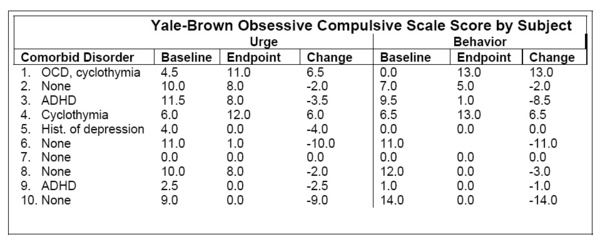The WAGER, Vol. 4(1) – Luvox populi
Fluvoxamine maleate, commonly known as Luvox, is commonly prescribed for patients suffering from obsessive-compulsive disorder. Its proven efficacy and relatively low incidence of side effects have made it a popular first-line treatment. Although chemically unrelated to the antidepressants Prozac and Zoloft, it shares the same pharmacodynamic mechanism and acts by selectively blocking the reuptake of serotonin. Noting the phenomenological and clinical similarities between pathological gambling and other obsessive-compulsive spectrum disorders, Hollander et al. (1998) performed a single-blind, preliminary trial investigating the efficacy of Luvox for gambling disorders. It should be noted that Luvox is readily available and frequently prescribed. What is being tested is not the medication’s worthiness for market entry, but rather its utility for a particular illness.
Only subjects having a DSM-IV diagnosis of pathological gambling and a minimum SOGS score of five were included in the study. Using the Yale-Brown Obsessive Compulsive scales for urge and behavior, Hollander and his team established baseline scores for ten participants during an eight-week placebo period. These scores were compared to those obtained during the period in which subjects were given Luvox. The average dose administered was 220mg per day. Baseline and endpoint scores are presented in the table below.
Using the information above in addition to other clinical data, Hollander classified seven out of the ten subjects as treatment-responders. At the conclusion of the trial, all seven were abstaining from gambling behavior. For the entire sample, Yale-Brown urge scores decreased 30% during the study. Among treatment-responders, a 64.6% decline was noted. Yale-Brown behavior scores exhibited a parallel overall decline of 33%, rising to 86% when only treatment-responders are considered. On an anecdotal basis, these results are very encouraging. But Luvox has a long road to travel before it is officially indicated for pathological gambling. As Hollander points out, his work is preliminary; further research is needed using larger samples and a double-blind, randomized design.
Source: Hollander, Eric., et al. (1998) Short-term single-blind fluvoxamine treatment of pathological gambling. American Journal of Psychiatry, 155: 1781-1783
